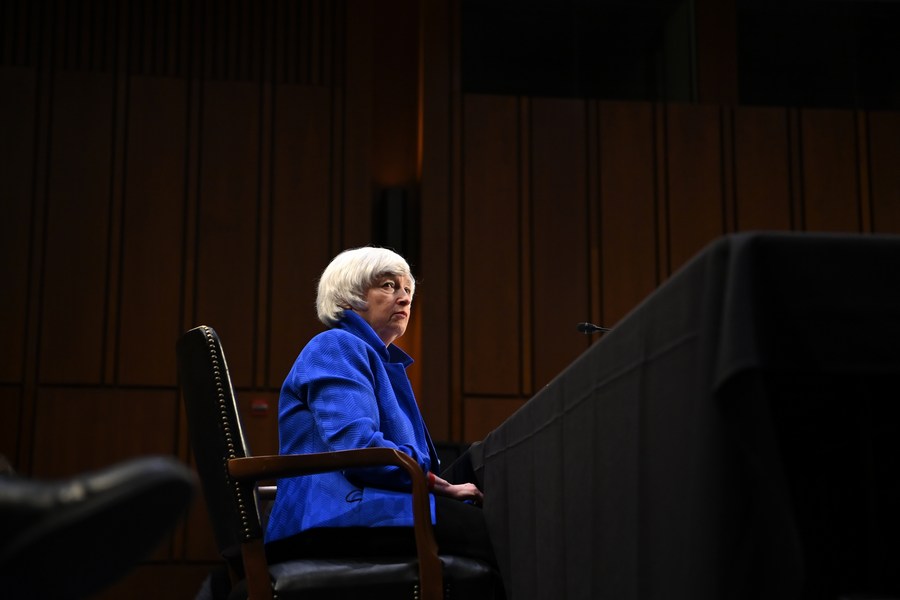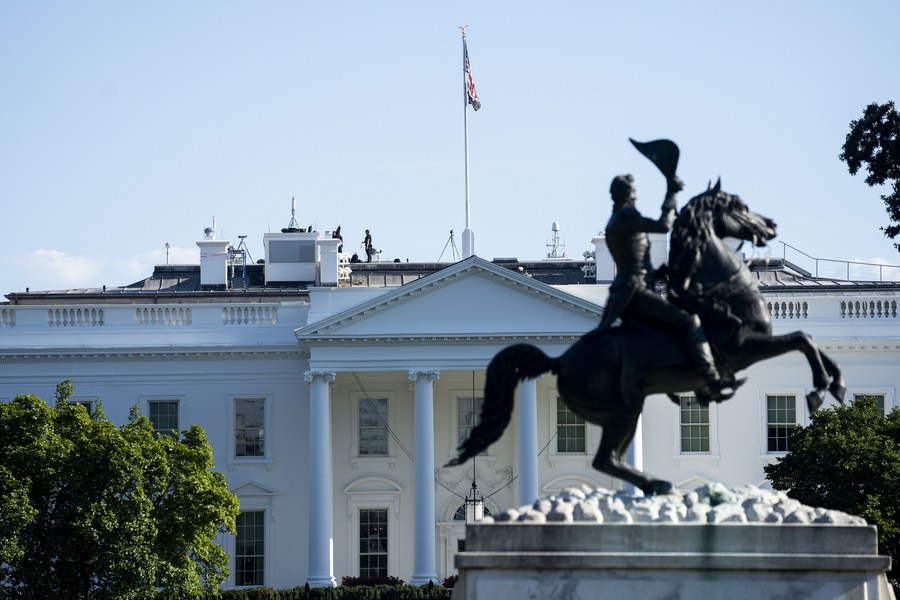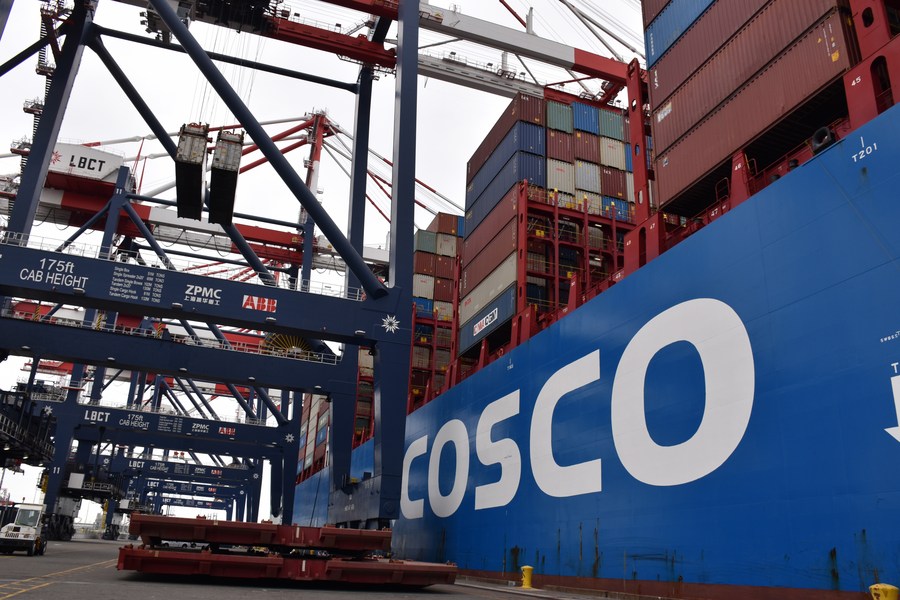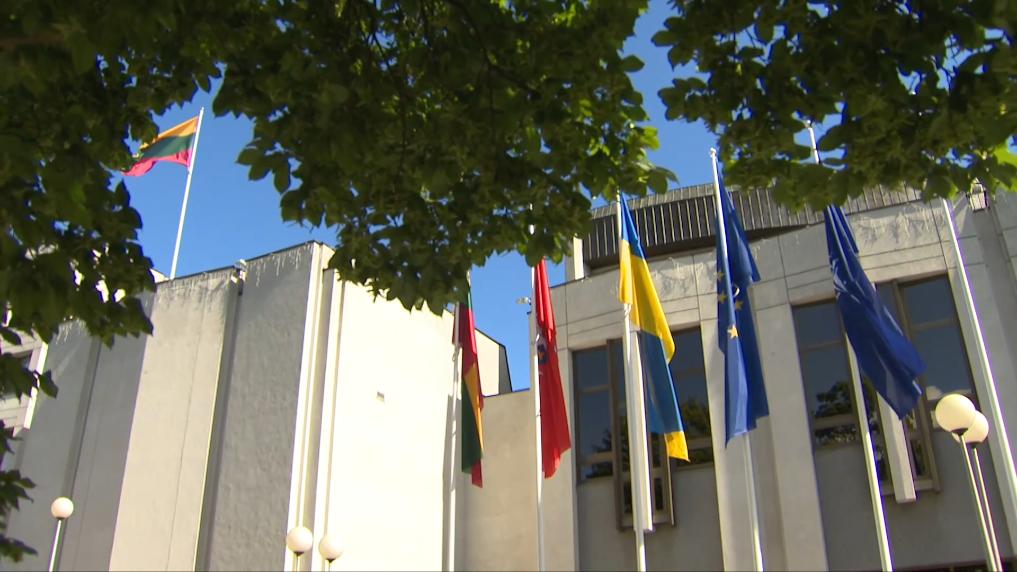
U.S. Treasury Secretary Janet Yellen testifies during a Senate Banking, Housing, and Urban Affairs Committee hearing in Washington, D.C., the United States, Sept. 28, 2021. (Matt McClain/Pool via Xinhua)
The similar tone of both sides' evaluations reflects their shared emphasis on strengthening such communication and their common need to improve China-U.S. relations.
BEIJING, July 13 (Xinhua) -- U.S. Treasury Secretary Janet Yellen recently concluded her visit to China, summarizing conversations during the four-day trip as "direct, substantive, and productive." The Chinese side also described the interaction as "candid, pragmatic, in-depth, and constructive."
The similar tone of both sides' evaluations reflects their shared emphasis on strengthening such communication and their common need to improve China-U.S. relations.
Overall, as recognized by both sides, this round of interaction has injected positive elements for stabilizing China-U.S. relations because it characterizes three keys to improving bilateral ties.
The first key is to deepen communication.
During her visit, Yellen expressed the willingness to implement the understandings reached by the two heads of state in Bali last year and strengthen communication between the two sides. As for China, it has always shown utmost sincerity in resolving differences with the United States through dialogue.
However, since the meeting between the two heads of state in Bali, the United States had not shown any restraint in smearing and suppressing China, severely poisoning the atmosphere for dialogue, and compelling the delay of the interactive agenda set by the two heads of state.
As Yellen said at a press conference before concluding her visit, the bilateral meetings during the visit, which totaled about 10 hours, "served as a step forward in our effort to put the U.S.-China relationship on surer footing."
Given the current state of China-U.S. relations, restarting communication is not an easy task, but what matters most is to sustain it based on mutual sincerity.
The United States should know that communication is not a one-time deal: it requires creating a favorable atmosphere beforehand, building consensus during the process, and solidly implementing them afterward.

This photo taken on Aug. 16, 2022 shows the White House in Washington, D.C., the United States. (Xinhua/Liu Jie)
To achieve more effective and meaningful interactions, the U.S. side should actively follow up on each dialogue and earnestly implement the consensus and outcomes reached during the discussions.
The second key is to address mutual concerns.
The aim of establishing communication channels is to facilitate a clear and smooth expression of major concerns and basic positions by both sides.
In recent years, the United States has imposed a string of economic sanctions and measures against China, which have undermined the legitimate rights and interests of Chinese market entities and eroded the popular support for bilateral relations.
During meetings with Yellen, the Chinese side reiterated its concerns regarding issues such as the removal of tariffs on China, cessation of suppression against Chinese companies, fair treatment of bilateral investments, relaxation of export controls on China, and lifting the ban on products related to China's Xinjiang Uygur Autonomous Region.
In response, Yellen said that the United States is willing to listen to China's concerns, does not seek to decouple from China, and has no intention of hindering China's modernization process.
In the current lowest point of China-U.S. relations since the establishment of diplomatic ties, this kind of constructive interaction is conducive to stabilizing and reversing the downward spiral in the bilateral relationship.
The third key is to seek consensus.
As the world's largest developing and developed economies, China and the United States have built their economic relationship over several decades.
Strengthening cooperation is a pragmatic necessity and the right choice for both nations. Through open and sincere communication, the two sides should seek consensus on important economic issues, injecting stability and positive energy into their economic relationship.

A container ship of China's COSCO Shipping docks at a container terminal of the Port of Long Beach in California, the United States, Aug. 20, 2021. (Xinhua/Gao Shan)
Currently, global challenges such as macroeconomic and financial destabilization, climate change, and debt issues are escalating. Effective responses to these global challenges require coordination and cooperation between China and the United States, which aligns with their common interests.
Yellen said during the visit that the United States does not seek to decouple from China as it would be disastrous for both countries and create instability globally, and it has no intention to force countries to take sides.
"The world is big enough for both of our countries to thrive," Yellen said at the end of her visit.
This round of interaction between the two countries brings positive expectations for bilateral relations. However, it is necessary to be wary of the United States' habitual double-talk on issues concerning China.
Just as Yellen visited China, Bloomberg reported that the U.S. government is preparing an executive order to restrict American investments in China, suggesting that the next test for the bilateral relationship may come soon.
Regardless of whether the United States is playing a double game or not, China never places its destiny in the hands of other countries, and remains focused on its own development. The autonomy over its own fate provides China with both the determination and confidence in handling all international issues, including China-U.S. relations.■












